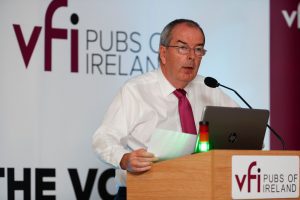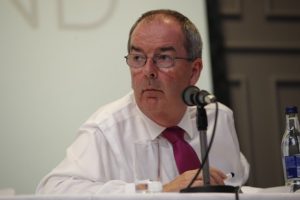“For me – for many members – the VFI is an insurance policy that I hope they never have to use”

It’s been nothing if not an eventful 14 years for Padraig Cribben, the Vintners Federation of Ireland’s Chief Executive, who’ll be stepping down from his post after the next VFI AGM in Tullamore this May.
He’s not one to quibble over whether he’s ‘retiring’ or not.
“I call it ‘standing down’ from the VFI but you can call it ‘retirement’ – I’m not precious about it,” he tells me.
But of all the ‘events’ in the last decade-and-a-half, perhaps Covid-19 takes the uncoveted biscuit for the most significant. However business has been good since the licensed trade around the country was allowed re-open.
“The initial recovery has been good” he agrees as we sit in his office at the Federation’s red-brick HQ in Rathfarnham, “but we’ve to be careful too. There was pent-up demand in consumers just to get out again after two years in Lockdown. Young people needed to get out and socialise. Older people had missed celebrating significant birthdays and anniversaries. A lot of that initial business had been pre-planned and indeed re-planned over the last number of months, so trade has been good.”
But there’s still the rest of the year to get through…. “It’s obviously very early in the year and tourism hasn’t kicked in yet” he says, “but airline capacity is at around 90% of pre-Covid although that’s a double-edged sword as they take people out of the country too. I think the environment is there to travel again and I think recovery in tourism will be quicker than most had anticipated”.
Challenges
Consumer recovery is one thing but there are serious challenges on the other side of the counter in the short term such as staffing and inflation.
“Inflation is manifesting itself primarily in energy costs,” he explains, “An energy bill of €1,500 a month now costs the guts of €3,000.
“There’s also a lot of debt overhang which will come into play next year. For example there’s VAT and PAYE warehousing, so there’s going to be significant challenges but right now staffing and inflation pose the biggest of these.”
Padraig remains optimistic, going as far as to venture, “It’s not naive to think all will be back to normal again by the Summer of 2023.
“But by Summer 2023 we’ll be where we’re going to be and that’ll be the new normal as people will have sorted out their inhibitions by that stage.”
So we’ll not simply be in a new form of 2019 again by mid-2023.
Undoubtedly, the pandemic will have reduced Federation membership but as yet he’s not sure by how much.
“We’ve no final figures as there’re still quite a few that haven‘t opened yet,” he explains, “That won’t become clear until April – particularly considering those that decided not to open while bar counter ordering was out.
“I’m reasonably confident that we’re not looking at the anticipated ‘Armageddon’ of 1,000 to 1,500 pubs ‘though.
“I’d expect that we’re now back to 92-96% openings on the basis of what we’ve seen so far and our intelligence on the ground.”
April will be relevant.
By then he’ll have seen who traded in March.
“Anyone who didn’t trade for St Patrick’s or Easter is unlikely to open in the short term,” he believes, “The other thing that will impact the on-trade is that there are quite a number of pubs that were leased where the lessee exited the lease during the pandemic. It may take quite a bit of time to get these re-leased – it’s a fraught enough area.”
Government’s handling of pandemic
Testy exchanges between vintners and the Government during Lockdowns and at either ends of them characterised the tensions that sometimes boiled over – but on the whole Padraig believes the Government got it pretty much right.
On balance, he says, there was no textbook for what was happening.
“Could I could pick holes in stuff that they and NPHET did? Absolutely! Could people pick holes in our own approach? Absolutely!
“But without the support we got we’d have a very different sector today and I think that the Government got the sector more or less right. Some things like short notice caught out food premises, for example, but in the round and objectively they did a pretty good job.”
Core purpose
Throughout his 14-year Chief Executiveship Padraig has been conscious of the Federation’s core purpose.
“The core of any trade association remains fairly clear – it’s about protecting members’ interests,” he says, “These change from time to time because economies change, trading conditions change – but the core of what we do is pretty stable.
“We like to think we maybe do it differently and better (but that’s for others to decide). We protect members’ interests, lobby on their behalf and offer a full suite of services to members.
“I’d like to think that hasn’t changed much over the years. But the sector itself has changed” he continues, “it has been hit by recession and other challenges and what we’ve seen, for example, in the last decade or so, has been a change in lifestyles, recessions and the major emigration of young people – all different challenges that affected the trade and therefore the priorities we had on behalf of our members.”
Perhaps the biggest of these challenge was the effect of the 2007-12 recession where a lot of the younger generation emigrated leaving a void in the community, a large hole in what would have been the trade’s biggest cohort of customers.
“That loss of revenue and viability was probably the biggest challenge,” he says, before adding, “The whole question of drink-driving legislation in the trade – particularly the most recent change where a reading of 50-80mg per 100 ml put you off the road rather than penalty points – was ‘over the top’ and wasn’t going to have the kind of effect that some politicians in particular suggested it was going to have.”

Job satisfaction
Standout moments? He can’t recall any particular ‘standout moment’ over the last decade and a half, “.. but to me, the headline-catching occasions were never the ones I got the most satisfaction out of or any satisfaction at all from”.
To him the highlights would be the occasions when a member got in contact because they’d an issue that was playing very seriously on their mind. “… and when you put the phone down afterwards you felt that you’d gone some way towards sorting out the problem or made a start on it at least. I suppose that would have been where the real satisfaction of the job came in”.
He does recall the VFI working for over a decade to get the Government to introduce Minimum Unit Pricing.
“That took patience and persistence,” he remembers.
“Overall, I’d like to think that we gave a good service to our members across a range of issues and that we continue to do so. For me – for many members – the VFI is an insurance policy that I hope they never have to use and I think we were challenged quite a bit in the last two years for that – and I’d like to think that we came up trumps, pretty much.”
Undeniably, there has been progress since he joined as Chief.
“One of first things we did was to get a grip on communications, both internally and externally. We felt that was necessary at the time, it was important. We invested a lot of time and effort into getting that right and I think the VFI would be seen now very much as the ‘goto spot’ for information on pubs outside Dublin. I think that we’re again at the core of what pubs do; we’ve enhanced our support for members and what we do for them and that’s a good place to be for any trade association.”
Initially, the progress of the Sale of Alcohol Bill is likely to occupy the new incumbent Paul Clancy’s time.
“That’s immediate and pressing and going to happen!” Padraig confirms, “I don’t know what’s going to be in it until the Minister for Justice brings forward her proposals.”
Perhaps it’s just as well, then, that he’ll be staying on until the middle or end of May.
After that, he’s nothing specific lined up “… but I’m probably not going to do ‘nothing’,” he smiles.
He plays a bad game of golf (his own words) and is interested in all sports, particularly GAA.
Oh – and he’d be continuing his passion for travelling.
In intending not doing ‘nothing’, you can be sure we haven’t heard the last of Padraig.








